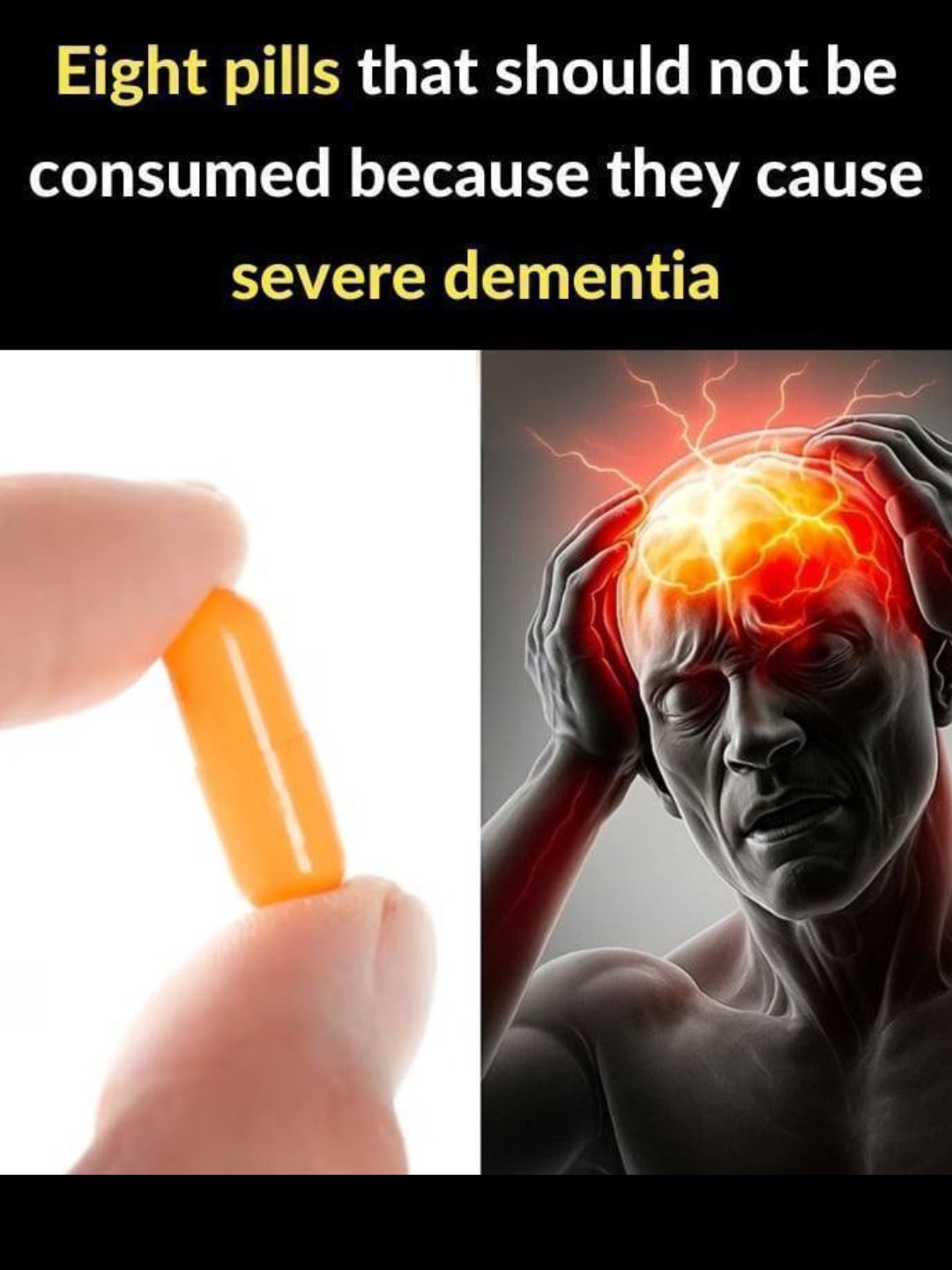
Alert: 8 Drugs Linked to Increased Dementia Risk — What You Need to Know to Protect Your Brain Health
🔹 Why it’s concerning:
Long-term PPI use has been associated with up to a 44% increased risk of dementia in older adults (Neurology, 2016). These drugs reduce stomach acid, which may impair absorption of vitamin B12, magnesium, and other nutrients critical for brain function. Some studies also suggest PPIs may promote buildup of beta-amyloid plaques — a hallmark of Alzheimer’s disease.
📌 Safer alternative: Short-term use only (4–8 weeks); consider lifestyle changes (diet, weight management) or H2 blockers like famotidine (Pepcid) for mild heartburn.
2. Anticholinergic Drugs
Examples: Diphenhydramine (Benadryl), Oxybutynin (for overactive bladder), Amitriptyline (low-dose antidepressant), Tolterodine (Detrol)
🔹 Why it’s concerning:
These drugs block acetylcholine — a key neurotransmitter involved in memory and learning. A landmark study in JAMA Internal Medicine (2019) found that long-term use of anticholinergics was linked to a 50% higher risk of dementia, even after adjusting for other factors.
📌 Safer alternatives:
For allergies: Use loratadine (Claritin) or cetirizine (Zyrtec) instead of diphenhydramine
For sleep: Try melatonin or cognitive behavioral therapy (CBT-I)
For bladder issues: Discuss non-drug options like pelvic floor therapy
3. Benzodiazepines
Examples: Alprazolam (Xanax), Diazepam (Valium), Lorazepam (Ativan)
🔹 Why it’s concerning:
Used for anxiety and insomnia, benzodiazepines are highly addictive and linked to impaired cognition, confusion, and increased dementia risk, especially in seniors. One study found a 51% increased risk with long-term use.
📌 Safer alternatives:
CBT for anxiety or sleep
Buspirone (non-addictive anti-anxiety med)
Mindfulness, meditation, or prescribed SSRIs for chronic anxiety
4. Sleep Aids (Non-Benzodiazepine “Z-Drugs”)
Examples: Zolpidem (Ambien), Eszopiclone (Lunesta), Zaleplon (Sonata)
🔹 Why it’s concerning:
Though marketed as safer than benzos, “Z-drugs” still act on similar brain receptors and are linked to confusion, memory lapses, and increased fall risk. Long-term use is associated with higher dementia incidence.
📌 Safer alternatives: Sleep hygiene, melatonin, or prescription alternatives like suvorexant (Belsomra)
5. Statins (Controversial but Monitored)
Examples: Atorvastatin (Lipitor), Simvastatin (Zocor)
🔹 Why it’s debated:
Statins lower cholesterol, which is vital for heart health — but cholesterol is also essential for brain cell membranes and hormone production. Some patients report brain fog, memory loss, or confusion. While large studies haven’t confirmed a direct dementia link, caution is advised, especially in older adults.
📌 What to do: Discuss risks vs. benefits with your doctor. Monitor cognitive symptoms. Never stop statins without medical advice.
6. Antipsychotics (Especially in Older Adults)
Examples: Risperidone (Risperdal), Quetiapine (Seroquel), Olanzapine (Zyprexa)
🔹 Why it’s concerning:
Often prescribed off-label for agitation in dementia patients, these drugs can actually worsen cognitive decline and increase mortality. The FDA has issued black-box warnings for their use in elderly patients with dementia-related psychosis.
📌 Use only when absolutely necessary, under close supervision.
7. Certain Antidepressants
Examples: Paroxetine (Paxil), Amitriptyline (Elavil) – particularly those with strong anticholinergic effects
🔹 Why it’s concerning:
Some antidepressants double as anticholinergics, increasing dementia risk with prolonged use.
📌 Safer alternatives: SSRIs like sertraline (Zoloft) or escitalopram (Lexapro), which have lower anticholinergic activity.
8. Antihistamines (First-Generation)
Examples: Diphenhydramine (Benadryl), Doxylamine (Unisom SleepTabs)
🔹 Why it’s concerning:
Frequently found in over-the-counter sleep aids and allergy meds, these cross the blood-brain barrier and block acetylcholine — the same mechanism tied to memory problems.
📌 Avoid regular use, especially in older adults. Opt for second-gen antihistamines like fexofenadine (Allegra) or loratadine.
🔍 How to Protect Your Brain While Managing Health
✅ Review all medications annually with your doctor or pharmacist
✅ Ask: “Is this still necessary?” — especially for long-term prescriptions
✅ Check the Anticholinergic Cognitive Burden (ACB) Scale — a tool that rates medications by dementia risk
✅ Prioritize non-drug approaches where possible (lifestyle, therapy, diet)
✅ Monitor for symptoms: Brain fog, forgetfulness, confusion — don’t dismiss them as “just aging”
📞 Always consult your healthcare provider before stopping or changing any medication.
❤️ Final Thought: Your Brain Deserves Protection Too
Medications save lives — there’s no doubt about that. But just as we protect our hearts and livers, we must also protect our brains from unintended harm.
The goal isn’t to fear medicine, but to use it wisely — with awareness, intention, and regular review.
Because a longer life means nothing if we can’t remember the moments that made it worth living.